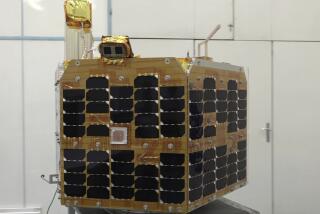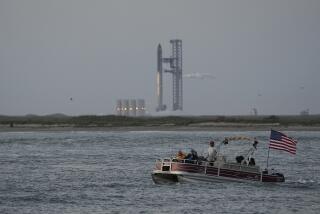One Step for Manned Space Travel in China
- Share via
BEIJING — An unmanned Chinese spacecraft rocketed into orbit early Wednesday in the second test flight of a vessel intended to one day carry astronauts and make China the third nation capable of manned space travel.
A Long March rocket blasted off from a Gobi Desert launch center at 1 a.m. and put the Shenzhou II spacecraft into orbit 10 minutes later, state media reported.
The spacecraft will return “in a few days,” after conducting experiments in physics and astronomy and on space’s effects on life forms, the New China News Agency said. Among the test subjects, newspapers said, were cell and tissue samples from 87 animals, plants and microorganisms.
China has placed great prestige on its secretive, 31-year-old space program and poured an undisclosed amount of resources into it. If successful, the program will lift China alongside the United States and Russia into the exclusive club of space travelers.
“An Important Step in Realizing Manned Spaceflight,” the People’s Daily, the Communist Party mouthpiece, said in a headline below a picture of the Long March 2-F rocket blasting off from the Jiuquan launch center in the north-central province of Gansu.
Newspapers praised the rocket and capsule as triumphs of domestic engineering, and President Jiang Zemin sent a telegram.
“I hope you will work persistently and unremittingly to achieve even greater victory,” Jiang said in his message to the program’s civilian and military personnel.
A smooth flight and safe return would mean China could be ready to put astronauts aloft in 18 to 24 months, said Joan Johnson-Freese, a Hawaiian-based analyst and one of the few foreign experts on the Chinese space program.
The government, however, has been circumspect about when it will send up astronauts--or what some Chinese have dubbed “taikonauts,” from the Chinese word for space. Program scientists and officials quoted by state media in recent months have suggested it could come within the next five years.
Wednesday’s flight was the second unmanned test of the Shenzhou family of space capsules in less than 14 months. In the first test, in November 1999, the Shenzhou, or “sacred vessel,” orbited Earth for 21 hours before landing on the grasslands of China’s northern Inner Mongolia region.
More to Read
Sign up for Essential California
The most important California stories and recommendations in your inbox every morning.
You may occasionally receive promotional content from the Los Angeles Times.












